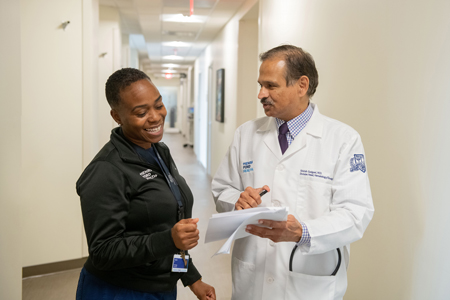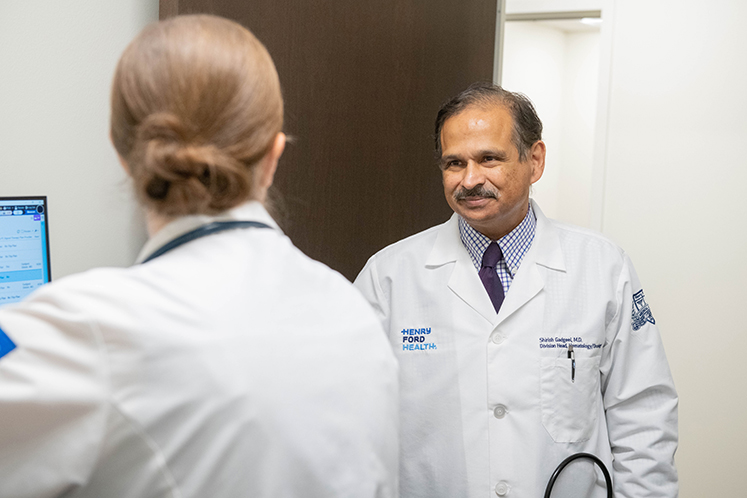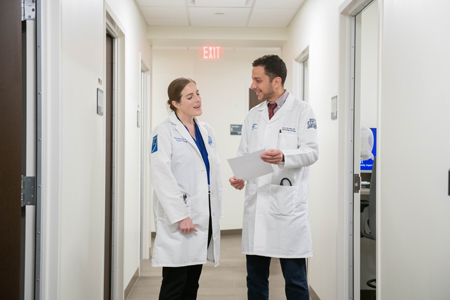Medical Oncology
 We offer the most advanced medications to treat cancer.
We offer the most advanced medications to treat cancer.
Medical oncology is the use of powerful medications to destroy cancer cells. These include a variety of treatments, such as chemotherapy, immunotherapy, anti-tumor antibiotics and drugs that disrupt a tumor’s food source. Our medical oncologists are at the forefront in the research and development of new therapies, and we are often one of the first and only cancer programs in Michigan to offer the most advanced medical treatments for certain types of cancer.
Newly diagnosed?
The first step: Cancer type
The specific medical oncology treatment that is best for you will depend in part on the type of cancer. Your personalized care plan may also include other types of cancer treatment, such as radiation therapy or surgery. Review your specific type of cancer to learn more about the available treatments.

Innovative Treatments

Types of medical oncology treatments
-
ChemotherapyThis is the best known form of medical oncology treatment. Chemotherapy acts directly on cancerous and non-cancerous tumors, killing fast-growing cells.
-
Alkylating agentsAlkylating agents work directly on a person's DNA to prevent cancer cells from reproducing. Examples of alkylating agents include busulfan, cisplatin, carboplatin, chlorambucil, cyclophosphamide, ifosfamide, dacarbazine (DTIC), mechlorethamine (nitrogen mustard) and melphalan. These drugs are used to treat chronic leukemia, non-Hodgkin's lymphoma, Hodgkin's lymphoma (also known as Hodgkin’s disease), multiple myeloma and certain cancers of the lung, breast, and ovary.
-
AntimetabolitesThis type of medical oncology treatment interferes with DNA and RNA growth. Examples of antimetabolites include 5-fluorouracil, capecitabine, methotrexate, gemcitabine, cytarabine (ara-C) and fludarabine. Antimetabolites are used to treat chronic leukemia as well as tumors of the breast, ovary and the gastrointestinal tract.
-
Antitumor antibioticsThese interfere with the growth of cancer cells at the DNA level. They work by stopping enzymes and cell division or by altering the membranes that surround cells. Examples of antitumor antibiotics include dactinomycin, daunorubicin, doxorubicin (Adriamycin), idarubicin and mitoxantrone. These are not the same as antibiotics used to treat infections. Since these agents work in all phases of the cell cycle, they are widely used for a variety of cancers.
-
Corticosteroid hormonesCalled steroids, these are natural hormones and hormone-like drugs that are useful in treating cancers such as lymphoma, leukemia and multiple myeloma. Often they are combined with other types of chemotherapy drugs to increase their effectiveness. Examples include prednisone and dexamethasone.
-
ImmunotherapyThis type of medical oncology treatment is used to stimulate your immune system to attack cancer cells. It includes biologic therapies such as CAR T-cell therapy, which targets specific types of leukemia and lymphoma.
-
Mitotic inhibitorsMitotic inhibitors are plant alkaloids and other compounds derived from natural products. They can inhibit or stop enzymes from making proteins needed for reproduction of the cancer cells. Examples of mitotic inhibitors include paclitaxel, docetaxel, etoposide (VP-16), vinblastine, vincristine and vinorelbine.
-
NitrosoureasThis is a group of anticancer drugs that can cross the blood-brain barrier and interfere with enzymes that help repair DNA. Since these agents are able to travel to the brain, they are used to treat brain tumors as well as non-Hodgkin's lymphoma, multiple myeloma and malignant melanoma. Examples of nitrosoureas include carmustine (BCNU) and lomustine (CCNU).
-
Sex hormonesSex hormones alter the action or production of female or male hormones. They are used to slow the growth of breast, prostate and endometrial cancers, which normally grow in response to hormone levels in the body. Examples include anti-estrogens (tamoxifen, fulvestrant), aromatase inhibitors (anastrozole, letrozole), progestins (megestrol acetate), anti-androgens (bicalutamide, flutamide) and LHRH agonists (leuprolide, goserelin).
 Why choose Henry Ford for your medical oncology care?
Why choose Henry Ford for your medical oncology care?
- Integrated team: Our medical oncologists work closely with our other cancer specialists to provide the most advanced care available.
- Innovative treatment: We are often one of the first and only cancer programs in Michigan to offer the most advanced medical treatments for certain types of cancer.
- Clinical trials and research: These studies help researchers find more effective, less toxic cancer treatment options. We are actively involved in national research studies through the Southwest Oncology Group, one of the largest cooperative groups funded by the National Cancer Institute for cancer clinical trials in the United States.
- Supportive oncology: We provide a range of services and resources to support your physical and emotional well-being during cancer treatment and beyond. This includes connecting you with dietitians, personalized exercise programs, palliative care, integrative medicine, support groups and other programs, and many other support resources.
- Survivorship: We recognize that your relationship with your medical oncologist is extremely important, especially since they frequently continue to check in with you long after you have beaten your cancer. Our team gives you and your loved ones a long-term roadmap for survivorship.
- Top-ranked program: Our compassion and attention to each person’s unique physical and emotional needs has earned our team placement in the top 1% in the nation for patient satisfaction, as measured by Press Ganey.
.svg?iar=0&hash=F6049510E33E4E6D8196C26CCC0A64A4)

/hfh-logo-main--white.svg?iar=0&hash=ED491CBFADFB7670FAE94559C98D7798)